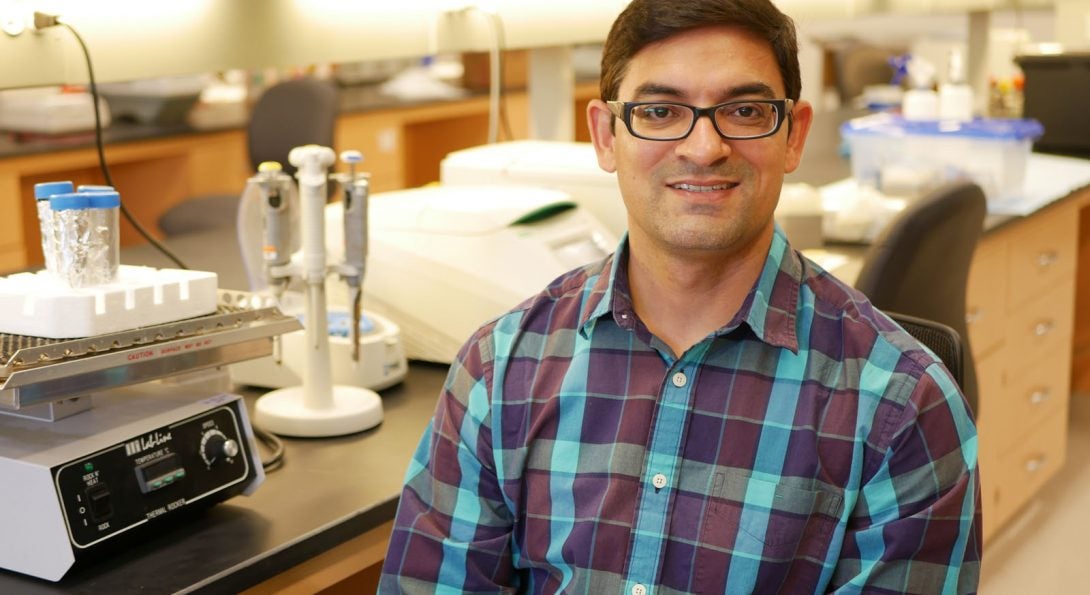What can the herpesvirus teach us about oral inflammation?

Based on article originally published by Jacqueline Carey
A $2 million grant from the National Institutes of Health will help University of Illinois at Chicago researchers study how herpesviruses, and their underlying molecular mechanisms, contribute to increased inflammation in oral diseases, like periodontitis, commonly referred to as gum disease.
The researchers, led by the UIC College of Dentistry’s Afsar Naqvi, will also study how manipulating the small molecules that help to regulate gene expression in the herpesvirus may aid health care professionals to diagnose and treat oral diseases.
 “Herpesviruses are unique in both their lifelong persistence in the human body and in their ability to encode viral microRNAs that not only alter their own genetic activities but their host cells’ functions as well,”
“Herpesviruses are unique in both their lifelong persistence in the human body and in their ability to encode viral microRNAs that not only alter their own genetic activities but their host cells’ functions as well,”
-- Afsar Naqvi, Assistant Professor, UIC Department of Periodontics.
MicroRNAs are small molecules in cells that help to control how genes are expressed.
“Herpesvirus encoded microRNA helps the virus to survive in multiple ways,” Naqvi said. “Because we see a correlation between herpesviruses and oral inflammation, we want to examine if viral microRNAs accumulate in inflamed oral tissues and if they impair the body’s immune responses.”
Naqvi and his team will study the impact of the five most common herpesviruses associated with oral inflammatory diseases and quantify their microRNA and genome levels.
“We want to identify the microRNAs that change when the tissue around the teeth becomes inflamed,” Naqvi said.

 RELATED RESEARCH:
RELATED RESEARCH:
NIH Funds Study on Viral microRNAs
in 2017, principal Investigator Dr. Afsar Naqvi, Research Assistant Professor; Dr. Sal Nares, Head; and Dr. Jezrom Fordham, Research Assistant Professor, Periodontics, received a National Institutes of Health R21 grant entitled, “Characterizing the Role of Viral microRNAs in Regulating Macrophage Plasticity.”
The funding, which was awarded in July 2018, will support this research for five years, during which time the researchers hope to uncover whether or not viral microRNA can be used as a biomarker to identify patients who may be more prone to oral inflammation and influence treatment decisions toward better outcomes. The research team will also investigate the molecular and cellular mechanisms through which disease-associated herpesvirus microRNAs dysregulate host immune cell functions.
“Understanding the way herpesvirus microRNAs affect oral inflammation may also help us develop better therapies and drug targets for common inflammatory conditions, not limited to those in the mouth, like periodontitis,” Naqvi said.
Working with Naqvi on this research are UIC’s Deepak Shukla, the Marion H. Schenk Esq. Professor of Ophthalmology, and Salvador Nares, associate professor and head of periodontics research.
 RELATED VIDEO: Research to Fight Periodontal Disease
RELATED VIDEO: Research to Fight Periodontal Disease
Periodontal Treatment at UIC
UIC periodontists are experts in treating periodontal (gum) disease, replacing missing teeth with dental implants and managing implant related diseases.
We provide a full range of periodontics care. Services include periodontal non-surgical treatments as well as advanced surgery and gum / bone grafting, regenerative procedures, dental implants, dental crown lengthening, and pocket reduction. We are also dedicated to educating our patients about the scientific link between periodontal disease and systemic disorders such diabetes, cardiovascular disease and complication during pregnancy.
